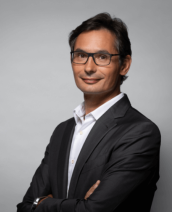Amaury Klossa
Partner
Amaury has over 15 years of experience advising senior executives and decision-makers on making strategic changes and achieving tangible results, with a strong focus on global, impactful projects in the energy transition.

Areas of Focus
Education
Past Experience

Amaury is a Partner based in our Paris office. He leads the “Energy & Utility” Practice in France and is a core member of the “Strategy & Organization” Practice.
Amaury is a topic expert in:
- Corporate strategy, growth strategy, and strategic planning/implementation
- Investment strategy
- Strategic due diligence
Prior to joining Arthur D. Little, Amaury worked for Emerton Strategy, Advancy, and Mars&Co in Paris, supporting Fortune 500 clients across all the continents in many geographies (over 30 countries) on a variety of topics in energy and utilities. He also has highly distinctive experience in emerging countries, especially in Africa and Latin America.
In addition to his consulting experience, Amaury worked for four years as European Development Director in a digital start-up (RVR Systems, now owned by Devoteam Group), focusing on compliance regulation and CSR for global companies.
Amaury is also an administrator and a member of the strategic Board of Tribvn Holding, an AI healthcare imaging start-up.
Amaury is a graduate of ESSEC Business School, and also completed a license in Chinese from the University of Shanghai. He is fluent in French, English, and Spanish, and has basic skills in Chinese.
Until 2019, he was Vice-President of the ESSEC Alumni Association (60,000 members), and he remains involved in strategic initiatives that aim to fully embed social and environmental stakes into the education, campus life, and research programs of the Business School.
Amaury is married and has three kids. In his free time, Amaury is a fan of photography and Chinese antics. He also enjoys trekking, cycling, and tennis.

Back to the future

Accelerating the financing of sustainable transport fuels

Energy: New business pillar for transport infrastructure operators

Offshore wind & hydrogen integration

Hydrogen: Trucking’s alternative fuel of the future

GROWTH IN A NET ZERO WORLD

Amaury is a Partner based in our Paris office. He leads the “Energy & Utility” Practice in France and is a core member of the “Strategy & Organization” Practice.
Amaury is a topic expert in:
- Corporate strategy, growth strategy, and strategic planning/implementation
- Investment strategy
- Strategic due diligence
Prior to joining Arthur D. Little, Amaury worked for Emerton Strategy, Advancy, and Mars&Co in Paris, supporting Fortune 500 clients across all the continents in many geographies (over 30 countries) on a variety of topics in energy and utilities. He also has highly distinctive experience in emerging countries, especially in Africa and Latin America.
In addition to his consulting experience, Amaury worked for four years as European Development Director in a digital start-up (RVR Systems, now owned by Devoteam Group), focusing on compliance regulation and CSR for global companies.
Amaury is also an administrator and a member of the strategic Board of Tribvn Holding, an AI healthcare imaging start-up.
Amaury is a graduate of ESSEC Business School, and also completed a license in Chinese from the University of Shanghai. He is fluent in French, English, and Spanish, and has basic skills in Chinese.
Until 2019, he was Vice-President of the ESSEC Alumni Association (60,000 members), and he remains involved in strategic initiatives that aim to fully embed social and environmental stakes into the education, campus life, and research programs of the Business School.
Amaury is married and has three kids. In his free time, Amaury is a fan of photography and Chinese antics. He also enjoys trekking, cycling, and tennis.

Back to the future

Accelerating the financing of sustainable transport fuels

Energy: New business pillar for transport infrastructure operators

Offshore wind & hydrogen integration

Hydrogen: Trucking’s alternative fuel of the future

GROWTH IN A NET ZERO WORLD
More About Amaury
- ESSEC
- University of Shanghai (China)
- EmertonPartner (Energy & Utility Practice)
- AdvancyPrincipal
- Mars&CoSenior Manager
